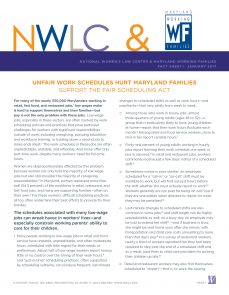As a second Trump administration approaches, we’re running out of time to confirm as many federal judges as possible to provide a check on his presidential power and curb his stated policy priorities.
For many of the nearly 350,000 Marylanders working in retail, fast food, and restaurant jobs, low wages make it hard to support themselves and their families—but pay is not the only problem with these jobs. Low-wage jobs, especially in these sectors, are often marked by work scheduling policies and practices that pose particular challenges for workers with significant responsibilities outside of work, including caregiving, pursuing education and workforce training, or holding down a second job to make ends meet. The work schedules in these jobs are often unpredictable, unstable, and inflexible. And many offer only part-time work, despite many workers’ need for full-time hours.
Maryland’s Fair Scheduling Act will provide more stable, predictable work schedules for food service and retail workers and greater economic security for Maryland families.

